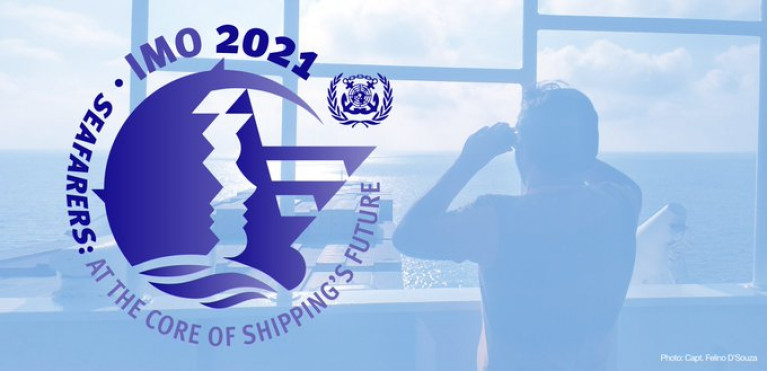Displaying items by tag: Webinar Today
World Maritime Day Highlights "Seafarers: At the Core of Shipping’s Future"
Today is World Maritime Day and where the International Maritime Organisation (IMO) and the global maritime community come together to celebrate the annual event with a focus on this year's theme: "Seafarers: At the Core of Shipping's Future".
As part of the celebrations, which are a fixture in the global shipping calendar, four seafarers will join in an interactive webinar to discuss issues of importance to the future of the sector.
(Seafarers today will share their views during a webinar on World Maritime Day at 12:00 BST - join here: bit.ly/3AVorVw)
In addition, the IMO Headquarters in London will be one of several iconic landmarks to be illuminated in blue, kicking off an annual initiative to unite the maritime community and raise awareness of the vital contribution of shipping to the world. It will also draw attention to seafarers and their core role in shipping and its future.
"Shipping drives world trade and that trade simply does not happen without seafarers. While the challenges of automation and digitalization - not to mention decarbonization - will drive change in shipping, we will always need well-trained and motivated seafarers. We must ensure a diverse and expert workforce for the ships of the twenty-first century and beyond," said IMO Secretary-General Kitack Lim.
The 2021 theme was chosen as part of a year of action for seafarers, who play a vital role as key workers for global supply chains but are facing unprecedented hardship due to the COVID-19 pandemic.
During 2021, IMO has interviewed several seafarers about topics of importance to them and the future of the sector. The profiles (on the IMO website and social media channels (Twitter, Facebook, LinkedIn and Instagram) spotlight issues related to the human element of shipping, including the safety and security of life on board ships, seafarers' well-being, and the importance of ensuring an appropriately trained and qualified workforce, ready to meet the challenges and opportunities of digitalization and automation.
Interactive webinar
On World Maritime Day, seafarers Ayse Basak, Yrhen Balins, Marwa Elselehdar and Thomas Madsen will be the seafarer panelists during a webinar which will focus on issues such as crew change, diversity, safety, and the environment.
To join the webinar, please visit the World Maritime Day page.
Illuminating in blue
This year IMO will launch a new annual initiative to unite the maritime community and raise awareness of the vital contribution of shipping to the world by bathing the IMO building in blue light on World Maritime Day. The Memorial to Seafarers, which was inaugurated 20 years ago in 2001, will be lit up at sunset, along with the IMO emblem on the building. A video feed will be shared on social media. This symbolic effort, supported by the International Transport Workers' Federation (ITF), will be echoed around the globe with many maritime stakeholders joining in and sharing their images and videos on social media using the hashtag #WorldMaritimeDay.
Secretary-General Lim has invited IMO Member States, intergovernmental organizations and non-governmental organizations in consultative status to join in this annual initiative by lighting up their most iconic buildings, bridges, maritime ports, ships, monuments, museums and other landmarks on World Maritime Day each year.
Social Media
IMO welcomes participation in World Maritime Day events from stakeholders on social media, especially seafarers. Individuals and organizations are encouraged to share images on social media channels using the hashtag #WorldMaritimeDay. Photographs can also be sent to: [email protected] World maritime theme for 2022
'New technologies for greener shipping' has been chosen as the World Maritime theme for 2022, reflecting the need to support a green transition of the maritime sector into a sustainable future, while leaving no one behind.
Find out more
Click World Maritime Theme 2021 (imo.org) to read more about World Maritime Day 2021 and find the message from the Secretary-General, video and more.
























































